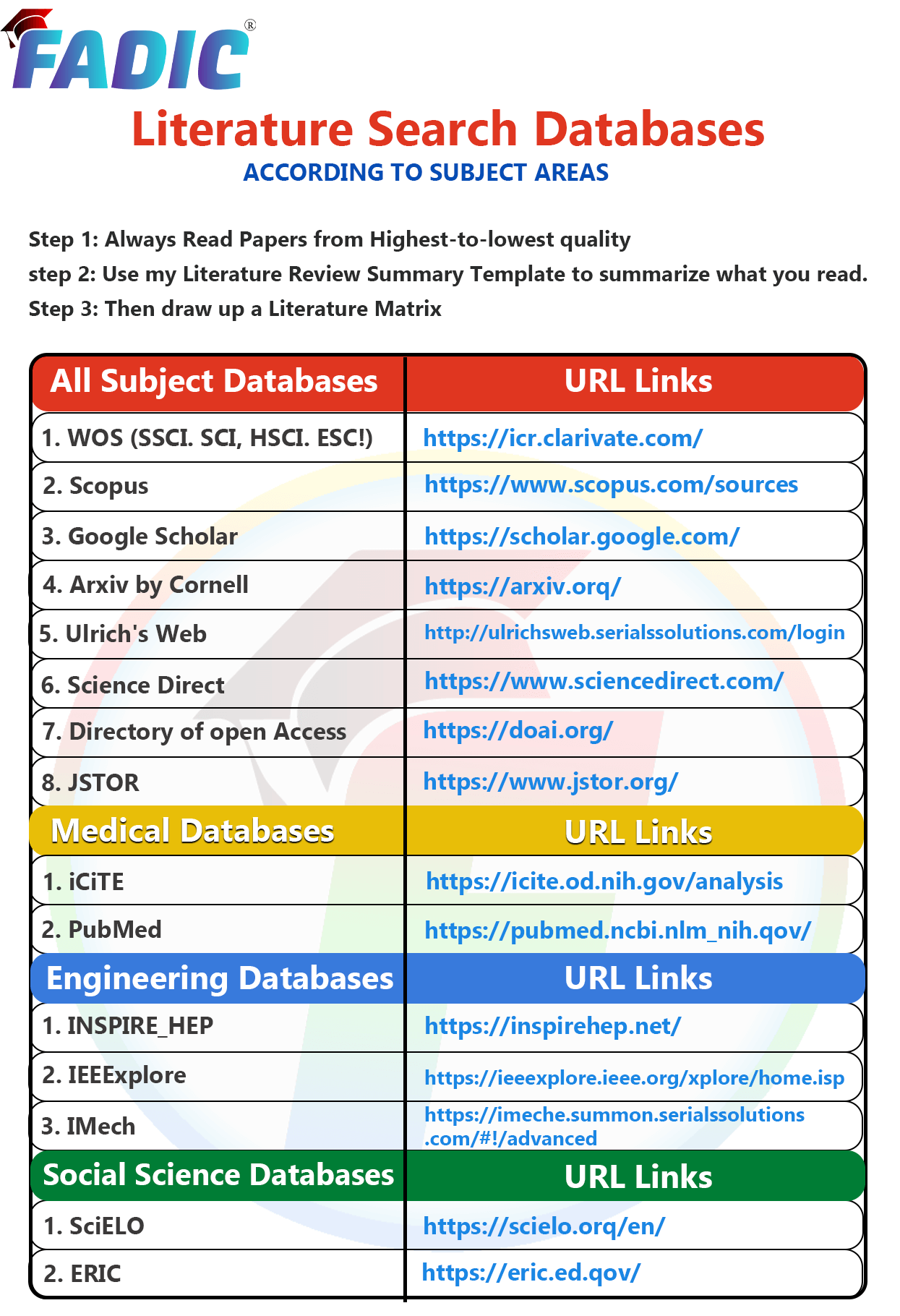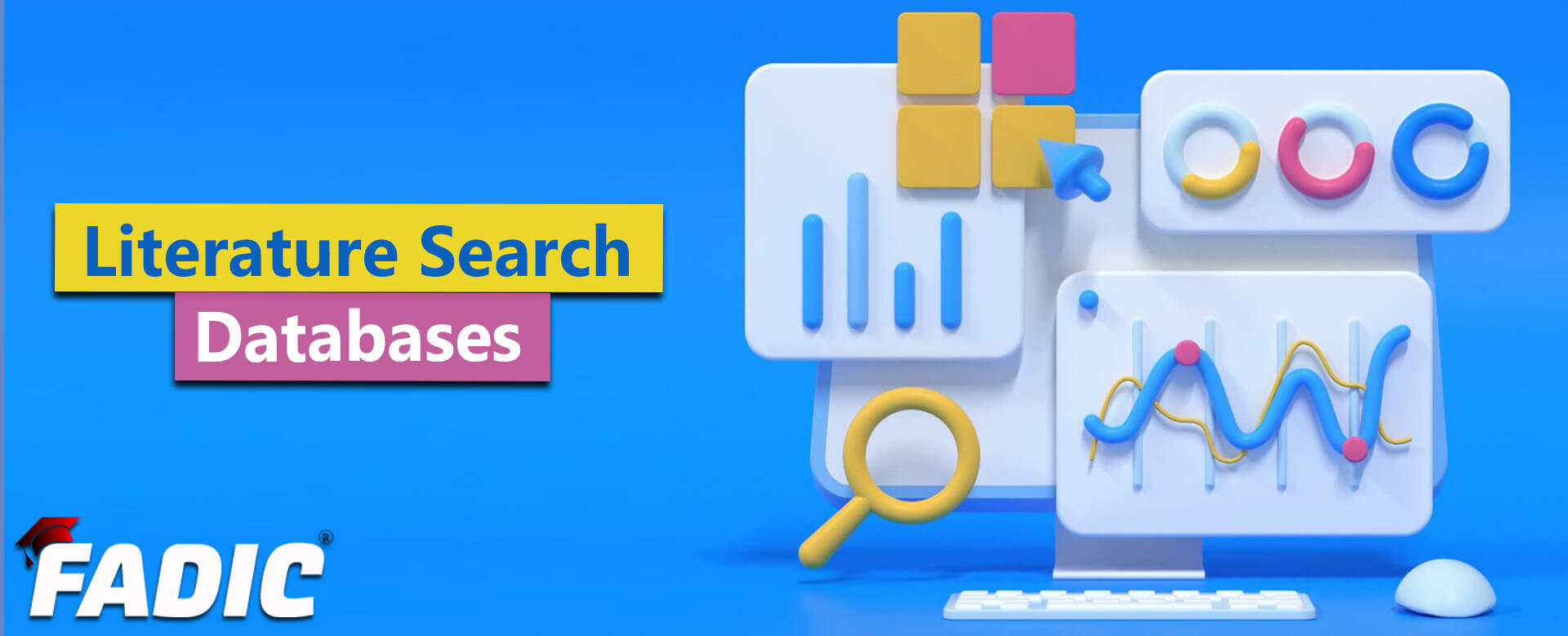Literature search databases
Best Literature Databases for Researchers
- Web of Science (WoS)
- Scopus
- Google Scholar
- Arxiv by Cornell
- Ulrichsweb
- Science Direct
- Directory of Open Journals (DOAJ)
- JSTOR
- SciELO
- ERIC
- iCite
- PubMed
- INSPIRE-Hep
- IEEE Xplore
- IMechE
Literature Search
-
Literature search database is a set of databases that index many different academic journals with different disciplines and other types of literature such as books and conference papers. For conducting research, reviewing articles, or a book, it’s better to search through multiple academic databases which helps avoid publication bias.
-
Moreover, it provides researchers and students with trusted resources, most likely peer-reviewed research articles.
- Thus, this article provides some of the key databases and platforms recommended for most researchers. It also helps them to keep up to date on the latest research relevant to their topic area as it is published. A top list of most used academic research databases is covered by this blog, let’s explore it together.

A Comprehensive Guide to the Best Literature Databases for Researchers
Web of Science (WoS):
- Web of Science (WoS) is one of the world’s leading multidiscipline bibliographic databases. It includes the highest impact and open-access journals and conference proceedings. Web of science covers 100+ million scientific articles in sciences, social sciences, arts, and humanities disciplines.
- Moreover, recently academic institutions provide free access to the Web of Science and Scopus on their campus network. Web of Science is maintained by Clarivate Analytics. All journals are submitted to the core Web of Science databases to be evaluated and indexed in the Emerging Sources Citation Index (ESCI). The Emerging Sources Citation Index aims to extend the scope of publications in the Web of Science to include high-quality and peer-reviewed publications.
- In addition, Clarivate Analytics owns all three indexing databases in the web of science– SCI, SCIE, and ESCI. Web of Science indexes include the Science Citation Index (SCI), Social Science Citation Index (SSCI), and Arts and Humanities Citation Index (AHCI).
- Thus, the journal indexed in the ESCI is discoverable on the Web of Science with full citation counts, author information, and other enrichment. Articles in ESCI-indexed will be included in an author’s h-index calculation. The Hirsch index (H-index) is a distribution-based indicator of both productivity (number of papers) and impact (number of citations) in one number. Read more
Scopus:
- One of the biggest bibliographic databases that cover scholarly literature from almost any discipline. Scopus is provided by Elsevier and covers 71+ million scholarly items.
- In addition to, searching for research articles, Scopus also provides academic journal rankings, author profiles, and an h-index calculator. Scopus allows full access by institutional subscription only.
- Moreover, Scopus searching allows access to authoritative research, identifies experts, and provides access to reliable data, metrics, and analytical tools. It increases the visibility of publications and allows a better representation of scholarly output, the validity of profiles, citations, and h-index scores. Read more
Google Scholar:
- Google Scholar is another database, good for conducting simple searches for scholarly literature across many disciplines and sources, including theses, books, abstracts, and articles.
- Google Scholar is a free academic search engine, that searches all the indexed information on the web, it searches repositories of publishers, universities, or scholarly websites. Additionally, advanced Scholar search provides additional search fields such as author, publication, and date, as well as phrase matching and word exclusion. It also provides a check for citing publications and graph citations over time. Read more
Arxiv by Cornell:
- Arxiv by Cornell is an open access to scholarly articles around the world in vast fields including physics, math, and computer science with their subdisciplines including statistics, electrical engineering, quantitative biology, and economics. Moreover, Arxiv is an archive for electronic preprints of scientific papers and is not peer-reviewed. Read more
Ulrichsweb:
- Ulrichsweb is a database that contains bibliographic detailed information on more than 300,000 periodicals (also called serials) of all types: academic and scholarly journals, e-journals, peer-reviewed titles, popular magazines, newsletters, newspapers, and more. Additionally, Ulrich’s is a user-friendly searching provides serials knowledge for researchers and librarians offering records information such as ISSN, publisher, language, subject, abstracting & indexing coverage, full-text database coverage, tables of contents, and reviews. Read more
Science Direct:
- Science Direct is a most important peer-reviewed academic literature platform which provides subscription-based access to a large database of scientific and medical research. Moreover, it contains the world’s largest collection of full-text and bibliographic information on science, technology, and medicine also many articles and journals on the humanities and social sciences.
- Additionally, Science Direct is one of the subsidiaries of Elsevier. Article abstracts are freely available, but access to their full texts generally requires a pay-per-view purchase. Articles published with open access are peer-reviewed and freely available to read and download. Read more
Directory of Open Journals (DOAJ):
- DOAJ is a unique and extensive index of diverse open-access journals covering all scientific and scholarly subjects. DOAJ is a community-curated online directory where all the articles indexed are open-access, peer-reviewed, and can be accessed free of charge. Read more
JSTOR:
- JSTOR is an archive of articles from scholarly journals and primary sources for disciplines such as arts, sciences, social sciences, and humanities. Read more
Social Sciences Databases
SciELO:
- SciELO (Scientific Electronic Library Online) is a bibliographic database and cooperative electronic publishing model of open-access journals. Besides, SciELO was created to meet the scientific communication needs of developing countries and provides an efficient way to increase visibility and access to scientific literature. SciELO Citation Index helps researchers make a broader research connection. Read more
ERIC:
- The Education Resources Information Center is an online digital library of educational research and information, sponsored by the Institute of Education Sciences of the U.S. Department of Education. ERIC is an authoritative database of indexed and full-text education literature and resources. Also, it is an essential tool for education researchers of all kinds. Moreover, it includes records for a variety of source types, including books, journal articles, conference papers, dissertations, curriculum guides, and policy papers. Read more
Medical Databases
iCite:
- iCite is a tool to access a dashboard of bibliometric information for journal articles that have been included in the PubMed database. Moreover, citation data are drawn from PubMed Central, European PubMed Central, CrossRef, and Web of Science. Read more
PubMed:
- PubMed is a free full-text archive of biomedical and life sciences journal literature at the U.S. National Institutes of Health’s National Library of Medicine. In addition, PubMed stores abstracts and bibliographic details of more than 30 million papers and provides full-text links to the publisher sites or links to the free PDF. Read more
Engineering Databases
INSPIRE-Hep:
- INSPIRE-HEP is an open-access digital platform for high-energy physics literature. Moreover, INSPIRE-HEP offers open access to high-energy physics-related articles, including journal papers, e-prints, preprints, technical reports, conference papers, and theses. Read more
IEEE Xplore
- IEEE Xplore is a research database that provides access to journal articles, conference proceedings, technical standards, and related materials on computer science, electrical engineering and electronics, and allied fields.
- In addition, IEEE provides a wide range of quality publications that allow the exchange of technical knowledge and information among technology professionals. IEEE fields include electrical engineering, computing, biotechnology, telecommunications, power and energy, and dozens of other technologies. However, access to IEEE Xplore is organizational. Read more
IMechE
- The Institution of Mechanical Engineers is an archive that covers all aspects of mechanical engineering. This database includes technical papers, obituaries, works visits, technical drawings, meeting reports, and editorial comments, all covering some of the most influential and innovative years of engineering development. Read more
In conclusion of Literature search
- Firstly, choosing the best database depends on the type of literature to conduct, there are several types of available databases. However, when searching for relevant and reliable references, it is advisable to use multiple databases.
- Secondly, optimal searches in systematic reviews should search at least Web of Science and Google Scholar as a minimum requirement to guarantee adequate and efficient coverage.
- Lastly, Google Scholar is good for conducting simple searches across a broad number of databases. While for complex or in-depth searching we recommend that you search individual subject databases.
Read More:
- 10 Skills You Must Learn to Do Research via Google Scholar
- Register Now at FADIC Clinical Research School
- Buy FADIC Toolkit for Writing Research to Write a Great Research Paper
- Read 10 Skills You Must Learn to Do Research via Google Scholar in Arabic
- The FADIC Online Continuous Medical Improvement Programs & Mini-Courses.
- Check Now the FADIC Book store and Buy books in different specialities.
- Watch Now FADIC TV to Keep Yourself Updated.
- FADIC Podcast focuses on varieties of pharmacist perspectives in different specialities.
- Subscribe Now to FADIC 2020 Daily News (FNN) and Keep Updated.
- Check Now about Coronavirus Resource Information Center.

 Log in
Log in Sign up
Sign up